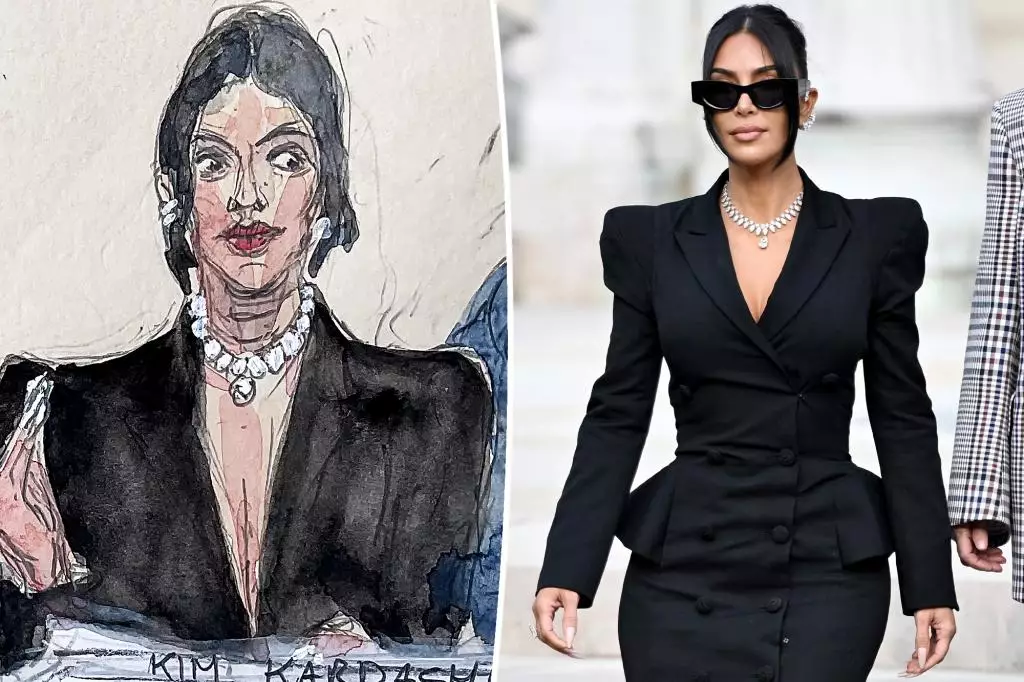In an event that remains etched in the public consciousness, Kim Kardashian’s harrowing jewelry heist continues to reverberate through the justice system. Eight members of the so-called “grandpa robbers” were recently found guilty by a Paris court for their role in a robbery that saw $10 million worth of jewelry stolen from Kardashian during the 2016 Paris Fashion Week. The stark contrast between the glitter of high fashion and the grim reality of crime was accentuated when the group’s ringleader, Aomar Aït Khedache, received an eight-year prison sentence, albeit with five years suspended, highlighting a leniency that raises eyebrows in the wake of such serious allegations.
This group, made up of aging men mostly in their 60s and 70s, challenges the narrative around criminals often being young and reckless. Their convictions, while a victory for justice, lead to questions about the adequacy of the sentences given the gravity of their actions and the psychological trauma inflicted on Kardashian. Could this be a reflection of societal attitudes toward elderly offenders, or is it merely a troubling loophole within the justice system?
The Court’s Decision: A Question of Leniency
The judicial outcome is as complex as the case itself. With ten defendants initially charged, the court acquitted two who were reportedly informants, shedding light on the intricate web of deceit that characterized this heist. While it is commendable that the court pursued justice, the suspended sentences for the majority of the defendants raise significant concerns. They serve as a reminder that justice is not always blind; it can be swayed by age and perceived frailty. What message does this send to the public regarding accountability?
Judges often grapple with the dual objectives of punishment and rehabilitation, particularly when the defendants are of advanced age. However, this leniency perhaps undermines the severity of their crime. For Kardashian, the trauma of the night has had lasting effects, not just on her psyche but also on her perspective towards justice. Her public expression of gratitude towards the French authorities for pursuing the case reflects a sense of closure, but one cannot help but wonder if true justice was served.
Kardashian’s Testimony: The Haunting Reality of the Robbery
Kardashian’s chilling recount of the events that unfolded on that fateful night underscores the ordeal far beyond the monetary loss. In court, she described the harrowing moments when she believed her life was in imminent danger—a knife at her throat and the unmistakable fear of death. “I thought I was going to die,” she confessed, painting a vivid picture of vulnerability. This is the true impact of crime; it’s not confined to financial ramifications. It shakes the very foundation of trust and safety in one’s life.
The public’s fascination with Kardashian often overlooks the human cost of such high-profile incidents. Viewing her only as a celebrity can detract from recognizing the deep emotional scars left by crime. Unfortunately, this case takes on a life of its own, illustrating how the human experience of fear and vulnerability can often become secondary to the glitz of celebrity culture.
Kardashian’s Legacy of Advocacy
Despite her ordeal, Kardashian has repositioned herself as an advocate for justice. Her statement following the verdict reflects not only a resolve to heal but also a commitment to transform her trauma into action. “I remain committed to advocating for justice,” she reported, showing maturity and a strong sense of purpose. This evolution from victim to advocate draws attention to the broader issues within the judicial system, particularly how it handles violent crimes and the support needed for victims.
Her story is a testament to resilience, showcasing how individuals can rise from their hardships and contribute to societal betterment. Kardashian’s ongoing work aims to improve the criminal justice system, emphasizing rehabilitation and support for victims over mere punishment for perpetrators. As observers, we must consider how each person’s journey through trauma can influence broader conversations around justice and accountability.
The verdict in this case encapsulates a significant intersection of celebrity culture, criminal justice, and personal narrative. As the ramifications continue to unfold, it inspires critical discussions about age, punishment, and the nature of justice itself in contemporary society. Is leniency a step towards compassion, or does it undermine the very principles of accountability and justice? As the story develops, we’ll watch closely how this case influences ongoing dialogues surrounding crime and punishment in an ever-evolving society.

